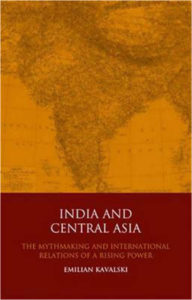
India and Central Asia: The International Relations of a Rising Power
Emilian Kavalski
I.B.Tauris (2009)
Rs10,809
India’s role in global politics draws increasing attention from the international community. Unprecedented economic growth in the recent past, rising fundamentalism in national politics and the knife-edge of nuclear-fuelled tension with an unstable Islamic government in Pakistan are all bound up in Indian claims to geopolitical ascendance. At the same time, Central Asia has re-emerged as a site of international contestation or a ‘new Great Game’, with Russia, China and the US vying over security and energy interests in a politically unstable region. In this fresh and penetrating analysis of India’s foreign policy, particularly on Central Asia, Emilian Kavalski illuminates India’s international ambitions and capabilities, and its complex dynamics with great powers USA, China and Russia. “India and Central Asia” provides a timely and much-needed assessment of the foreign policy of a rising power.
Emilian Kavalski is Lecturer in Politics and International Relations at the University of Western Sydney and author of ‘Extending the European Security Community’ (I.B.Tauris, 2008), editor of ‘The New Central Asia’ (2009) and ‘China and the Global Politics of Regionalization’ (2009), and co-editor (with M. Zolkos) of ‘Defunct Federalisms: Critical Perspectives on Federal Failure’ (2008).
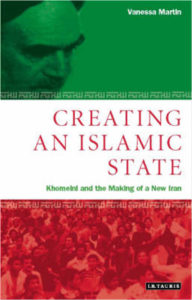
Creating An Islamic State: Khomeini and the Making of New Iran
Vanessa Martin
I.B. Tauris (2000)
Rs2,739
This extraordinary book is the first to analyze the ideological roots of an Islamic state as conceived by the Ayatollah Khomeini. Surprisingly the author finds much of the inspiration behind Khomeini’s political thinking being influenced by Western sources—his writings on the supreme Islamic Jurist being affected by Plato’s notions of the philosopher-king and his views of state power and centralism being closely linked to his understanding of Marxist/Leninist totalitarianism.
Vanessa Martin is Lecturer in Modern Middle Eastern History at Royal Holloway, University of London.
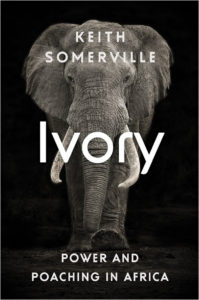
Ivory: Power and Poaching in Africa
Keith Somerville
Hurst Publishers (2017)
Rs3,664
Despite the 1989 global ivory trade ban, poaching and ivory smuggling have not abated. More than half of Tanzania’s elephants have been killed for their ivory since 2007. A similarly alarming story can be told of the herds in northern Mozambique and across swathes of central Africa. But why the new upsurge? The popular narrative blames a meeting of two evils — criminal poaching and terrorism. But the answer is not that simple.
Since ancient times, large-scale killing of elephants for their tusks has been driven by demand beyond Africa’s range states from the Egyptian pharaohs through the industrialising West to the new wealthy business class of China. Elephant hunting in Africa is also governed by human-elephant conflict, traditional hunting practices and the impact of colonial exploitation and criminalisation.
Ivory follows this complex history of the tusk trade in Africa, and explains why it is corruption, crime and politics, rather than insurgency, that we should worry about. In this ground-breaking work, Somerville argues that regulation — not prohibition — of the ivory trade is the best way to stop uncontrolled poaching.
Keith Somerville is a senior research fellow at the Institute of Commonwealth Studies, University of London and Honorary Professor of Journalism at the Centre for Journalism, University of Kent. His latest book, Africa’s Long Road Since Independence: The Many Histories of a Continent, has just been published by Hurst.
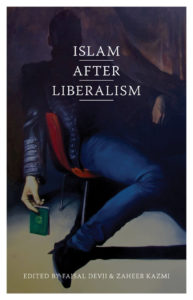
Islam After Liberalism
Edited by Faisal Devji and Zaheer Kazmi
Hurst Publishers (2017)
Rs3,664
Leading scholars discuss how ‘Islam’ and ‘liberalism’ have been entwined historically and politically and how Muslims have thought about this longstanding relationship.
Forged in the age of empire, the relationship between Islam and liberalism has taken on a sense of urgency today, when global conflicts are seen as pitting one against the other. More than describing a civilisational fault-line between the Muslim world and the West, however, this relationship also offers the potential for consensus and the possibility of moral and political engagement or compatibility. The existence or extent of this correspondence is a defining characteristic of writing on the subject.
This volume looks however to the way in which Muslim politics and society are defined beyond and indeed after it. Reappraising the ‘first wave’ of Islamic liberalism during the nineteenth century, the book describes the long and intertwined histories of these categories across a large geographical expanse. By drawing upon the contributions of scholars from a variety of disciplines — including philosophy, theology, sociology, politics and history — it explores how liberalism has been criticised and refashioned by Muslim thinkers and movements, to assume a reality beyond the abstractions that define its compatibility with Islam.
Faisal Devji is Reader in Modern South Asian History and Fellow of St. Antony’s College at the University of Oxford. He is the author of, inter alia, Muslim Zion: Pakistan as a Political Idea and The Impossible Indian: Gandhi and the Temptations of Violence.
Zaheer Kazmi is a Senior Research Fellow at the Mitchell Institute for Global Peace, Security and Justice, Queen’s University Belfast. He has held research and visiting positions at the universities of Oxford and Cambridge and is the author of Polite Anarchy in International Relations Theory and co-editor of Contextualising Jihadi Thought.
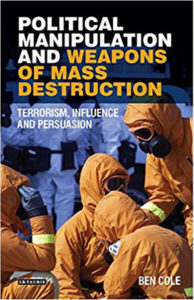
Political Manipulation and Weapons of Mass Destruction: Terrorism, Influence and Persuasion
Ben Cole
I.B.Tauris (2017)
Rs13,741
Concerns about CBRN (Chemical, Biological, Radioactive, Nuclear) weapons have featured prominently in both political debates and media reporting about the ongoing threat from al Qaeda since 9/11. This book provides a chronological account of al Qaeda’s efforts to acquire a CBRN weapon capability, and the evolution of the al Qaeda leadership’s approach to actually using CBRN weapons, set against the context of the politicisation of the threat of CBRN terrorism in US security debates. Ben Cole explores how the inherently political nature of terrorist CBRN threats has helped to shape al Qaeda’s approach to CBRN weapons, and shows how the heightened political sensitivities surrounding the threat have enabled some governments to manipulate it in order to generate domestic and international support for controversial policies, particularly the 2003 invasion of Iraq. He assesses the relative success of the al Qaeda leadership’s political approach to CBRN weapons, together with the relative success of efforts by the US, UK and Russian governments to exploit the al Qaeda CBRN threat for their wider political purposes.
Shedding new light on al Qaeda’s tactics and strategy, this book will be essential reading for scholars of terrorism and extremism studies.
Ben Cole is Honorary Research Fellow in the Department of Psychological Sciences, University of Liverpool. He specialises in the process by which individuals become radicalised into violent extremism; terrorist decision making with regard to CBRN terrorism; and real-time monitoring and analysis of conflicts and terrorist movements using online media. He worked on the development of the PVE tool and guidance, and lectures regularly on CBRN terrorism. He is the author of The Changing Face of Terrorism, co-author of Martyrdom: Radicalisation and Terrorist Violence Among British Muslims and editor of Conflict, Terrorism and the Media in Asia.

